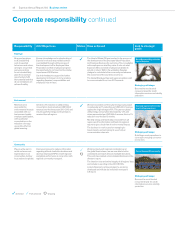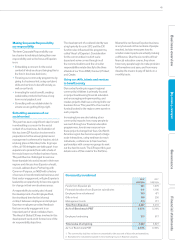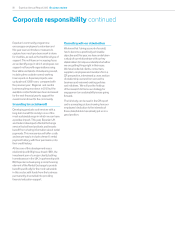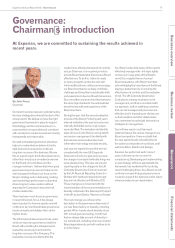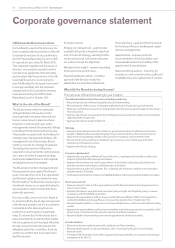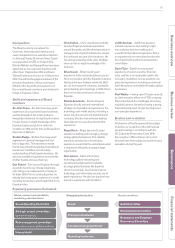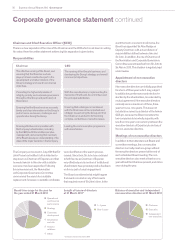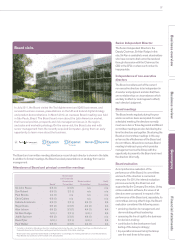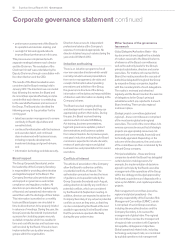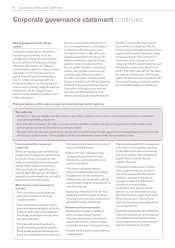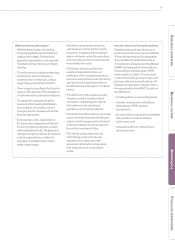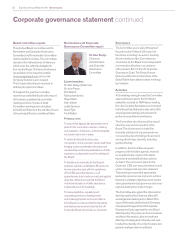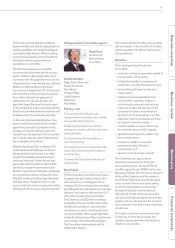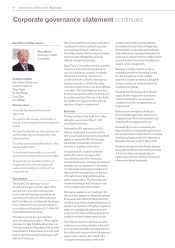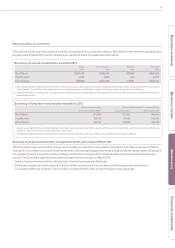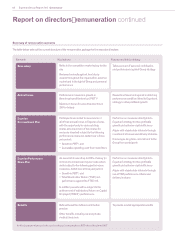Experian 2012 Annual Report Download - page 60
Download and view the complete annual report
Please find page 60 of the 2012 Experian annual report below. You can navigate through the pages in the report by either clicking on the pages listed below, or by using the keyword search tool below to find specific information within the annual report.
58 Experian Annual Report 2012 Governance
•performance assessment of the Board in
its operation and decision-making; and
•oversight of risk and opportunities to
improve Board performance in this area.
This process was complemented with
separate meetings between each director
and the Chairman. The evaluation of the
Chairman himself was undertaken by the
Deputy Chairman, through consultation with
the other directors and the CEO.
The results of the Board evaluation were
considered at the Board meeting held in
January 2012. The directors have concluded
that, following this review, the Board and
its committees operate effectively and also
consider that each director is contributing
to the overall effectiveness and success of
the Group. The Board also identified the
following among its ‘top priorities’ for the
coming year:
•talent/succession management, to ensure
continuity in Board style/culture and
executive talent;
•continued familiarisation with the business
and executive talent, and continued
close involvement with business issues,
including corporate development,
investment strategy and growth drivers;
and
•information technology and data security.
Board support
The Group Corporate Secretariat, under
the leadership of the Company Secretary,
is responsible for providing administrative
and logistical support to the Board. The
Company Secretary also provides advice
and support on governance and certain
compliance and regulatory matters. All
directors are provided with a regular supply
of financial and operational information to
assist them with the discharge of their duties.
This information is provided on a monthly
basis and Board papers are circulated in
time to allow directors to be properly briefed
in advance of meetings. During the year, the
Group Corporate Secretariat implemented
a process for circulating papers securely
via tablet computer, which has resulted in
time and cost efficiencies and has been very
well received by the Board. It has also been
implemented for use by other executive
groups within the organisation.
Directors have access to independent
professional advice at the Company’s
expense, if considered appropriate. No
director obtained any such advice during the
year ended 31 March 2012.
Induction and training
There is an induction programme for all
new non-executive directors which would
normally include business presentations
from senior management, site visits and
receipt of information about operating
procedures and activities of the Group,
the governance structure of the Group,
information on the duties and responsibilities
of directors and information on dealing in the
Company’s shares.
The Board received ongoing training
and development to ensure that they can
appropriately perform their duties. During
the year, the Board received training
sessions which included UK Bribery
Act training, business presentations,
legal and governance updates, product
demonstrations and business updates
from relevant leaders. As in previous years,
next year’s induction and training for Board
members is expected to include site visits,
reviews of particular regions and global
business lines and presentations from senior
executives.
Conflicts of interest
The articles of association of the Company
allow the Board to authorise conflicts,
or potential conflicts, of interest. The
authorisation procedure involves the issue
of guidance and a questionnaire by the
Group Corporate Secretariat each August,
asking directors to identify any conflicts or
potential conflicts, which are considered
by the Board at its September meeting. In
addition, directors are expected to advise the
Company Secretary of any actual or potential
conflicts as soon as they arise, so that they
can be considered by the Board at the next
available opportunity. It is the Board’s view
that the procedure operated effectively
during the year under review.
Other features of the governance
framework
Global Delegated Authorities Matrix – this
key document draws together the schedule
of matters reserved to the Board, the terms
of reference of the Board committees as
well as the authority levels for the Group’s
principal subsidiaries, directors and senior
executives. For matters not reserved to the
Board, the matrix prescribes the cascade of
authorities delegated throughout the Group
by respective Group companies, together
with the monetary limits of such delegations.
The matrix is reviewed and refreshed
regularly and the Board monitors the exercise
of delegations to the Group’s principal
subsidiaries which are reported to it at each
Board meeting. There are also regional
matrices in place.
Strategic project committees (global and
regional) – these committees are comprised
of the most senior global and regional
executives. The remit of the committees is to
oversee a process to ensure that all strategic
projects are appropriately resourced, risk
assessed and commercially, financially and
technically appraised. Depending on the
outcome of the discussions, the conclusions
of the committees are then considered by the
relevant Group company.
Principal subsidiaries – these are Group
companies to which the Board has delegated
certain decision-making powers, for
example, the implementation of decisions
agreed in principle by the Board; executive
management of the operations of the Group
within the strategy and budget approved by
the Board; acquisitions and disposals with a
value up to US$20m, and capital expenditure
projects.
Risk management committees (executive,
regional and global operations) – the
primary responsibility of the Executive Risk
Management Committee (‘ERMC’), which
is comprised of senior Group executives
including the executive directors and the
Company Secretary, is to oversee the
management of global risks. The regional
risk committees oversee the management
of regional risks consistent with Experian’s
risk appetite, strategies and objectives.
Global operational related risks, including
technology and project risks, are monitored
by a global operations risk management
Corporate governance statement continued


